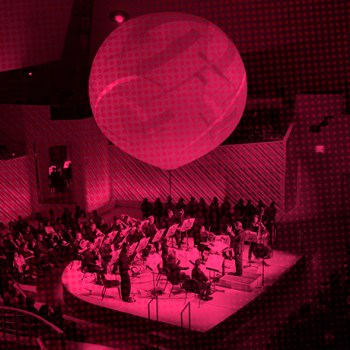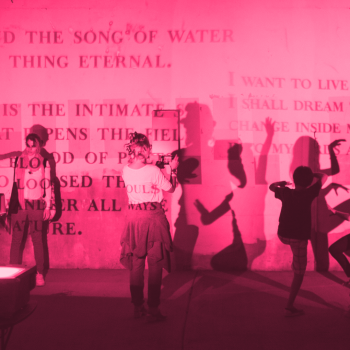
About
A Forum for Leaders at the Forefront of Innovation in the Arts
In the midst of rapid digital transformation, artists and arts organizations are harnessing technology to expand horizons, foster connections and redefine boundaries. At Catalyst, leaders at the forefront of innovation consider the implications of digital transformation in the arts through the lenses of sustainability, ethics and exploration and identify opportunities to enhance the creation, application and dissemination of art.
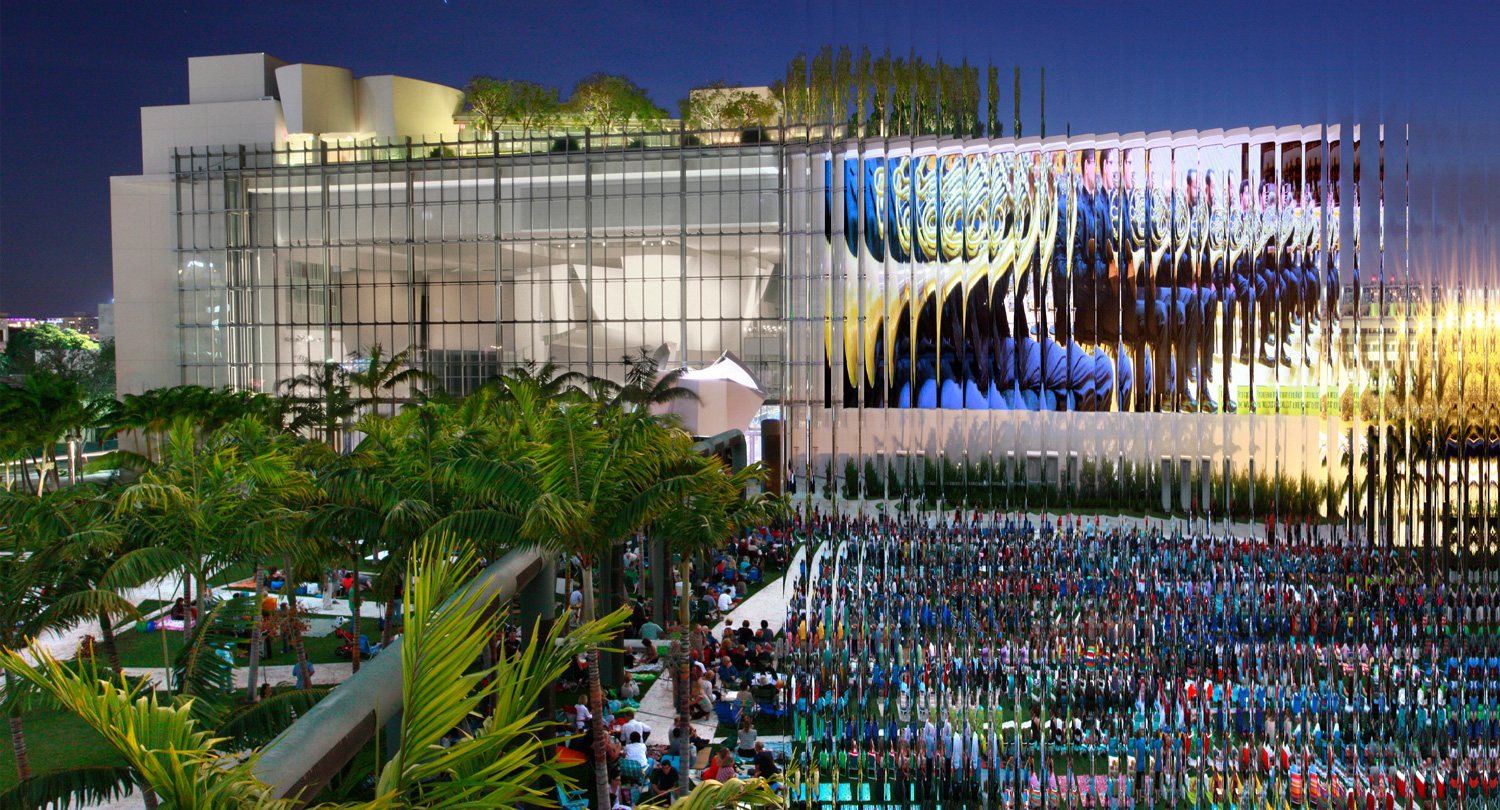
Session Videos
Recordings of our plenary sessions are available on-demand.
Innovation By Design
Delve into the evolution of the New World Symphony, and its home New World Center, which has emerged as a groundbreaking laboratory for the way music is taught, presented and experienced.
• Moderated by Philip Kennicott, Chief Art & Architecture Critic, The Washington Post
• Howard Herring, President & CEO, New World Symphony
• Craig Webb, Senior Partner & Architect, Frank Gehry Partners
Novel Operations
Explore how technology is being utilized to expand the reach and deepen the impact of arts organizations and cultural institutions.
• Moderated by Barbara London, Curator & Writer
• Steven Brady, Deputy Director for Digital Initiatives and Chief Technology Officer, Barnes Foundation
• Thom Collins, Neubauer Family Executive Director & President, Barnes Foundation
Ethical Frontiers
Discover how technology can enhance access to the arts through agency and participation while learning from art and tech trailblazers.
• Moderated by Roddy Schrock, arts organizer and curator, Executive Director, Eyebeam Art & Technology Center
• Lauren Lee McCarthy, Artist, Creator of p5.js, and Professor and Co-Director Social Software, UCLA
• Dr. Safiya Noble, Professor, UCLA, Co-founder & Co-director of the UCLA Center for Critical Internet Inquiry
Pushing Limits
Discover how technology can reshape artistic practice with pioneers working at the forefront of creative expression and experience a new work by Marco Brambilla.
• Moderated by Jennifer Farah, Director/Arts, Knight Foundation
• Marco Brambilla, artist and director
• Stephanie Dinkins, transdisciplinary artist
Crowd-Sourced Photo Project
Knight Foundation asked a random selection of about 25 attendees to document their day using disposable cameras. A selection of photographs are below, and the full gallery can be accessed and downloaded, here.
Featured Artists & Works
Scroll through all of Catalyst’s featured artists and works below, or make a selection to jump to further information.
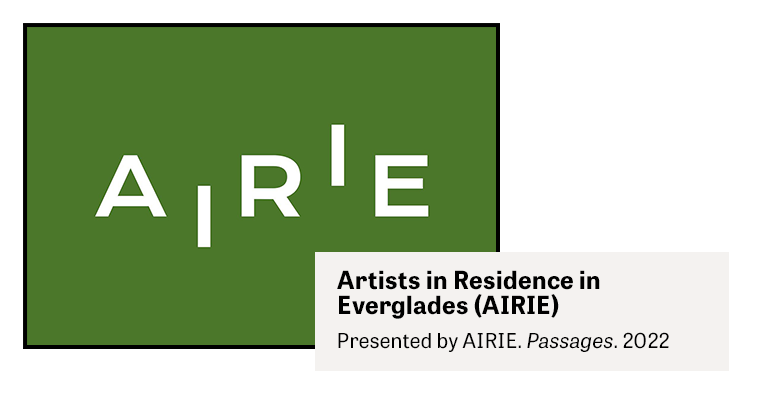
Former Miami grantee explores Black and Indigenous histories in the Everglades, taking viewers on a journey through the River of Grass at sunset and paying homage to the Florida Highwaymen in this multimedia experience.
Directed by Cornelius Tulloch, with performances by Arsimmer Mccoy and Kunya Rowley, and a video by Alexa Caravia and Justin Matousek.
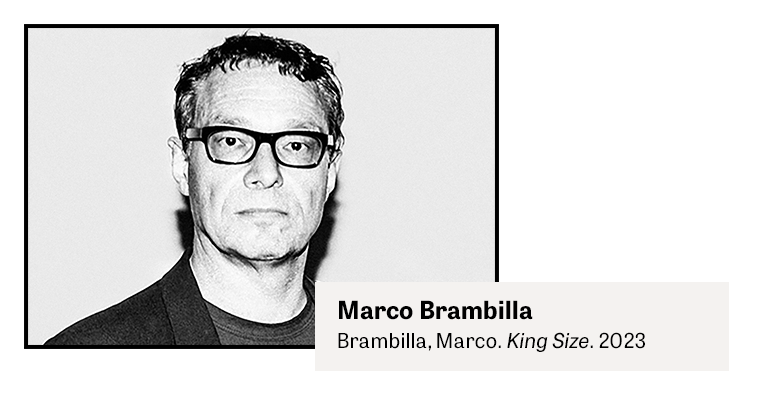
Marco Brambilla is a London-based artist known for his elaborate recontextualizations of popular and found imagery, as well as his pioneering use of digital imaging and AI technologies in time-based media art. Brambilla’s work has been internationally exhibited and is in the collections of the Museum of Modern Art, Guggenheim Museum, San Francisco Museum of Modern Art, ARCO Foundation (Madrid), Kunsthalle Vogelmann (Germany), and the Corcoran Gallery of Art . Notable shows include New Museum, Santa Monica Museum of Art , Seoul Biennial, Broad Art Museum, Borusan Contemporary (Istanbul) and Kunsthalle Bern (Switzerland).
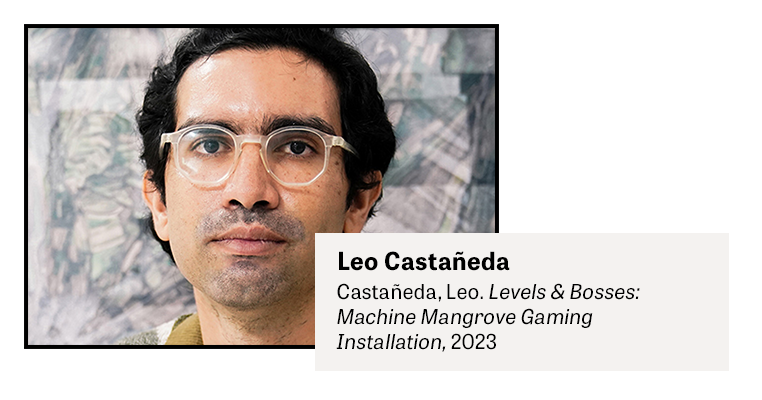
Machine Mangrove Gaming Installation highlights a new videogame episode and transmedia works in Leo Castañeda’s Levels & Bosses series expanding Latin American Surrealism for the digital age. Audiences traverse a posthuman mangrove biome where all landscapes, technology and beings are identifiably interconnected. To interrogate the progression structures of video games, participants use a broad range of mechanics including harmonizing, touch, camouflage, deep listening and illumination. Melding gaming, painting, 360° video art, textiles, furniture and a digital instrument, Castañeda creates participatory artworks that reimagine sustainable models of interaction and energy consumption in mass media.
Fusing gaming software with traditional fine art methods, Castañeda has generated industry-innovating texturing techniques and game mechanics for virtual assets that reinterpret South Florida and Latin American biodiversity through a continuous loop between analog and digital arts. Throughout Machine Mangrove Gaming Installation, Castañeda builds on Latin American art movements from Brazilian Tropicália and Mexican Muralism to Venezuelan kineticism, where the viewer is a navigator whose movement and perspective play a role in shaping the work itself, as Phillip Penix-Tadsen discusses in Shift Space 3.0 highlighting the 2023 Knight Arts + Tech Fellows.
Leo Castañeda is a Colombian American artist living and working in Miami. Castañeda received a BFA from Cooper Union and an MFA from Hunter College. His work explores how the language and structures of video games intersect with the world at large, in the form of episodic games, installations, video art, virtual reality, sculpture and painting. Castañeda is a Knight Foundation Arts + Technology Fellow, YoungArts Artist Technology Fellow, Emergent Strategy Ideation Institute Praxis Projects participant and Harpo Foundation awardee. He is a former resident of the Bronx Museum AIM Program, Oolite Arts, SOMA Mexico City and Khoj International Arts Association in New Delhi, India.
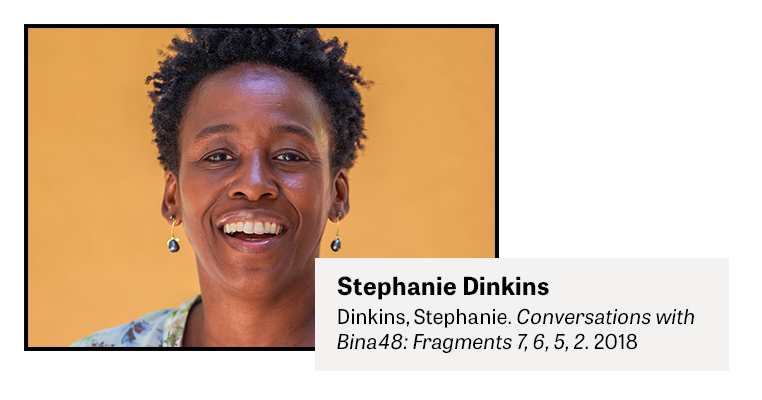
Can an artist and a social robot build a relationship over time? In her Conversations with Bina48 series, artist Stephanie Dinkins and Bina48, one of the world’s most advanced social robots, test this question through a series of videotaped interviews.
Conversations with Bina48 is an ongoing art project that features a series of video interviews Dinkins conducts with an advanced Black social robot. In 2014, Dinkins started visiting Bina48, a humanoid robot said to be capable of independent thought and emotion, with the aim of befriending her and getting her to answer the question: “Who are your people?” To date, the two have discussed family, racism, faith, robot civil rights, consciousness, loneliness, knowledge, age and Bina48’s concern for her robot friends that are treated more like lab rats than people. Their conversations have been entertaining, frustrating—for both robot and artist–– surprisingly humorous, philosophical and, at times, absurd. Some of the resulting videos are presented here.
We are entering a new technological epoch that will completely change the way we live, work, love and remember (skeptics should recall the iPhone is only ten years old). Artificially intelligent systems are increasingly the ubiquitous, unseen arbiters of our social, civic and family lives. Ever-increasing computational power, combined with almost unlimited data, has led to a turning point in the way artificial intelligence assists, judges and cares for humans. The need to understand how, where and why bias enters human-robot interactions is more important than ever. Embodied AI will eventually become widely available vehicles and repositories for our life stories. And, disseminators of culture that are literally able to explain ideas and stories from the past to future generations. It is imperative that our AI doppelgangers be developed and coded in ways that convincingly represent the rich diversity of stories, cultures, and physicalities of the human family.
Stephanie Dinkins is a transmedia artist who creates experiences that spark dialogue about race, gender, aging and our future histories. Her work in AI and other mediums uses emerging technologies and social collaboration to work toward technological ecosystems based on care and social equity. Dinkins teaches at Stony Brook University, where she holds the Kusama Endowed Chair in Art. She was recently named one of Time Magazine’s 100 Most Influential People in AI (2023) and is the inaugural recipient of the LG-Guggenhiem Award (2023) for artists working at the intersection of art and technology.
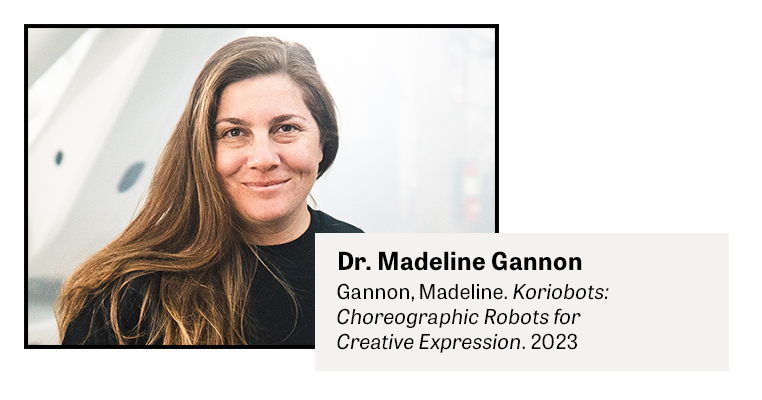
This Knight-funded installation was created by Dr. Madeline Gannnon, a multidisciplinary designer inventing better ways to communicate with machines. It features a team of koriobots—cable-driven robots that are dynamically choreographed to make things seemingly float through mid-air.
The koriobot platform is an open-source toolkit aimed at unlocking more imaginative experiences in robotics. It is designed to empower artists and designers to explore, create and innovate in this rapidly advancing, high-impact technology.
For Catalyst, the koriobots will be used to debut a new musical performance made in collaboration with the New World Symphony fellow and violinist Ye Jin Min. Min composed and choreographed a new piece titled “Four Moons” that she will perform as a duet with the koriobots.
Dr. Madeline Gannon is a multidisciplinary designer blending techniques in art, design, computer science and robotics to forge new futures for human-robot relations. Known as the “robot whisperer,” Gannon specializes in convincing robots to do things they were never intended to do, from transforming giant industrial robots into living, breathing mechanical creatures, to taming hordes of autonomous machines to behave like a pack of animals.
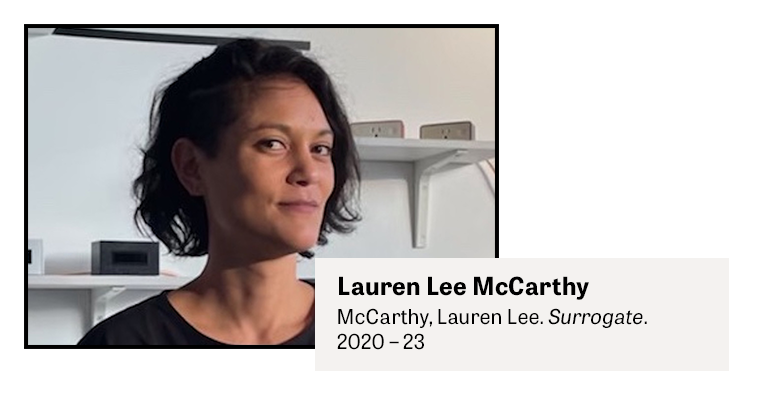
In Surrogate, Lauren Lee McCarthy personally offers her body as a remote-controlled surrogate to carry someone else’s child for nine months. The installation on view follows McCarthy as she discusses this proposition to potential parents and intensively navigates the process with consultation from doctors, psychologists, fertility specialists, surrogates, doulas, midwives and geneticists. This deeply personal work offers McCarthy’s body as physical, emotional and conceptual surrogate for understanding reproduction and technology’s role in it. The act of becoming a remote control surrogate serves as a metaphor for the control we may soon hold through processes of genetic engineering, as well as the immediate infringement on our bodily autonomy enacted by the legislation of reproductive rights worldwide.
Lauren Lee McCarthy is an artist examining social relationships in the midst of surveillance, automation and algorithmic living. She is a Creative Capital awardee, United States Artists Fellow, LACMA Art + Tech Lab grantee and has been awarded fellowships and residencies from Sundance, Eyebeam, MacDowell, Pioneer Works and Ars Electronica. Her work SOMEONE was awarded the Ars Electronica Golden Nica and the Japan Media Arts Social Impact Award, and her work LAUREN was awarded the IDFA DocLab Award for Immersive Non-Fiction. McCarthy’s work has been exhibited internationally, including at the Barbican Centre, Haus der elektronischen Künste, SIGGRAPH, Onassis Cultural Center, IDFA DocLab, Science Gallery Dublin and Seoul Museum of Art.
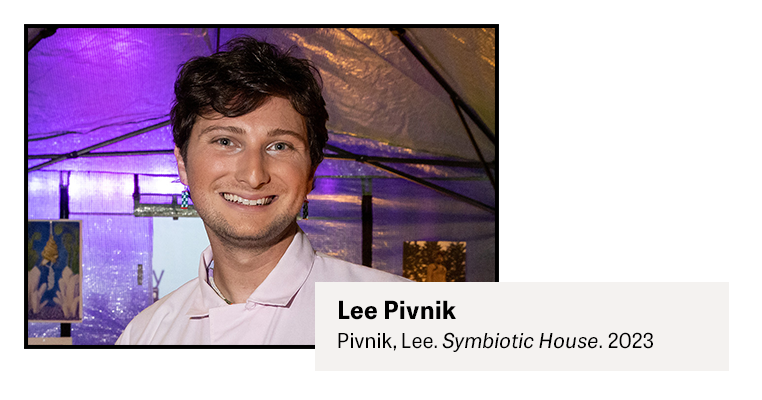
Holographic renderings of adaptive architecture form Symbiotic House, a long-term project that reimagines the home as a potential site for climate care and adaptation. Symbiotic House will grow into a nature-culture learning center while enacting embodied mutualism as a design strategy. The project spawns from the artist’s personal desire to continue dwelling in a climate-precarious city through crafting ecological reciprocity.
Lee Pivnik is an artist living in Miami. A former Knight Arts Challenge winner and United States Artists Knight Arts + Tech Fellow, Pivnik works across disciplines taking inspiration from living systems and other species to imagine a future based on mutualistic relationships instead of extractive economies. Permeating his practice is the idea of entanglement––the touching, changing, mutating relationships between species and landscapes. Through these intimacies, worlds arise—worlds of decay and degradation or verdant flourishing. His drawings, sculptures and installations share this relational quality, referencing fungal networks, epiphytic plants and emergent animal architectures that inhabit South Florida.
He co-directs the Institute of Queer Ecology (IQECO), an ever-evolving collaborative organism that brings peripheral solutions to environmental degradation to the forefront of public consciousness.
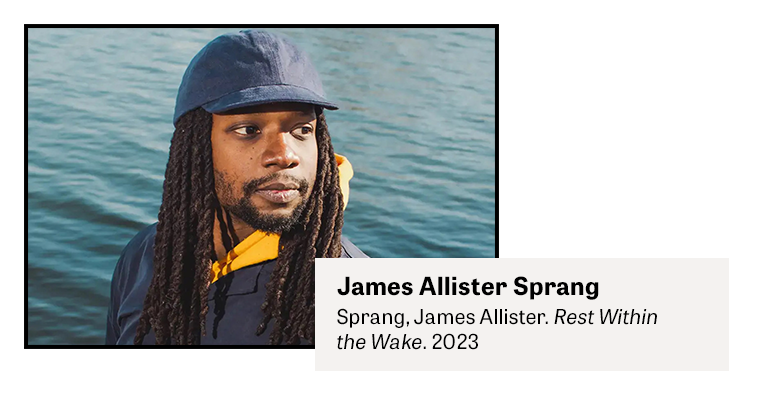
Former United States Artists Knight Arts + Tech Fellow James Allister Sprang presents a musical composition that anchors a session of somatic listening in the genre of “orchestral spiritual jazz.” Written sixty feet beneath the surface of the Caribbean Sea, the work is intimately tethered to texts In the Wake by Christina Sharpe; The Black Interior by Elizabeth Alexander; and Inciting Joy by Ross Gay.
James Allister Sprang is an artist, technologist and researcher producing work that celebrates the sensory experience of Black life. Currently based in Philadelphia, he received an MFA from the University of Pennsylvania and a BFA from Cooper Union. Sprang has completed more than twenty residencies internationally and in 2022 was the recipient of the Pew Fellowship and the Knight Foundation Art + Tech Fellowship for his work with the only 4DSound system in the nation. Sprang has worked extensively with AI, advanced spatial sound systems and emerging tech. He has exhibited at the Aldrich Contemporary Art Museum, Brooklyn Museum, Pennsylvania Academy of Fine Arts Museum, Storm King Art Center, The Kitchen, Baryshnikov Arts, The Public Theater, TATE Modern (UK) and MONOM (Germany), among others. His work has been reviewed in Artforum, Art in America and Art Papers.
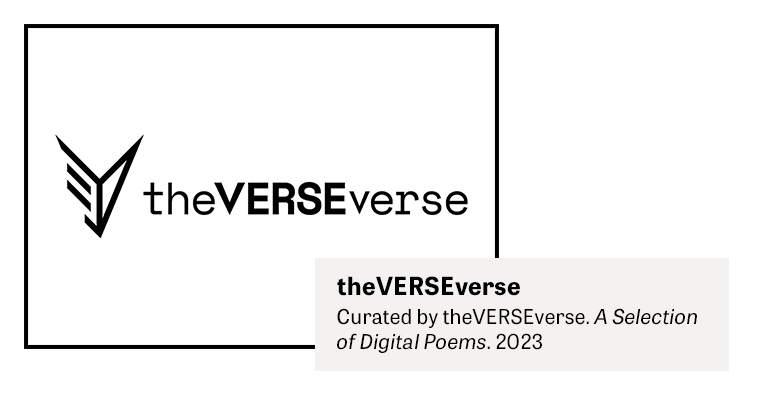
This selection of multidimensional poems presented by theVERSEverse embodies their mission to explore the myriad ways in which words and images intertwine, growing together.
Since 2021, the collective of poets, artists and technologists has explored the creative potential for composition and publication via blockchain, a realm where writers are empowered to transact their work, transcend the printed page and collaborate with one another.
This offering—a small sample of the hundreds of techno-infused poems they’ve ushered into the world—is planted here as a seed for the poetry anthology of the future, in which authorial imagination is unbounded, language and art exist in symbiosis, and every contributor is a vital force in a literary ecosystem in which connection to verse can lead to its collection.
Featured Speakers
Makayla Bailey is the co-executive director of Rhizome at the New Museum. Bailey has held curatorial positions at the Museum of Modern Art and the Studio Museum in Harlem, where she co-organized the institution’s first digital exhibition, titled Hearts in Isolation. Bailey’s work has been featured in Artforum, ArtNews, Frieze, Harper’s Bazaar, Hyperallergic, PIN-UP, Essence and i-D Magazine. Her current research spans the environment, ethical stewardship of emerging technologies and the creation of an equitable historical accounting of born-digital art.
Steve oversees all digital and information technology at the Barnes Foundation. With over twenty-five years of experience in Higher Education and the Cultural Sectors, he has played a crucial role in the Barnes’s pivot to online learning, notably in the development of the groundbreaking Visual Experience Platform. Holding two master’s degrees in Computer Engineering and Technology Management from Villanova University, his expertise in creating engaging platforms and driving revenue through technology have enriched visitor’s experiences and set new standards in accessible and inclusive art education.
Marco Brambilla is a London-based artist known for his elaborate recontextualizations of popular and found imagery, as well as his pioneering use of digital imaging and AI technologies in time-based media art. Brambilla’s work has been internationally exhibited and is in the collections of the Museum of Modern Art, Guggenheim Museum (New York); San Francisco Museum of Modern Art; ARCO Foundation (Madrid); Kunsthalle Vogelmann (Germany); and the Corcoran Gallery of Art (Washington, DC). Notable shows include New Museum, New York; Santa Monica Museum of Art (Retrospective); Seoul Biennial, Korea; Broad Art Museum; Borusan Contemporary, Istanbul; and Kunsthalle Bern, Switzerland.
Brambilla has worked with Creative Time and Art Production Fund in New York to present public art installations and commissions, including his Nude Descending Staircase No.3 presented at the Oculus World Trade Center during Frieze New York. Notable collaborations include the visuals for 7 Deaths of Maria Callas, an opera by Marina Abramović; and Pélleas et Mélisande, presented by the Opera Vlaanderen in Antwerp, Belgium. Brambilla is a recipient of the Tiffany Comfort Foundation and Tiffany Colbert Foundation Awards. His work has been featured at the Venice Film Festival and Sundance film festivals, as well as Fondation Beyeler in Basel, Switzerland.
Dejha Carrington is an arts leader dedicated to supporting artists in community and collaboration.
In 2017, Carrington co-founded Commissioner, an art membership that helps people collect the work of contemporary artists in their cities. She currently serves as executive director and has launched the program in Miami, Detroit, New York and, more recently, her hometown of Montreal. She also consults on strategy and programming with nonprofits and social impact initiatives, including the Center for Global Black Studies at the University of Miami, New Art Dealers Alliance, On Running, Hewlett-Packard and House of Blues.
From 2015 to 2022, Carrington served as vice president of strategic communications for YoungArts, the national foundation for the advancement of artists. Previously, she managed public relations with Kimball Art Museum in Fort Worth, Texas; the Medellin Biennial in Colombia; and the National Film Board of Canada.
Carrington is a board member of the national performance art funder MAP Fund, and a professional advisory committee member of Miami-Dade Art In Public Places and the New York University Center for Black Visual Culture’s Black Rest Project. She shares her time with the Black School, an experimental schoolhouse in New Orleans, and the Detroit Institute of Art’s Friends of African and African American Art. Miami is home.
Thom Collins is the Neubauer Family Executive Director and President at the Barnes Foundation. An innovative educator and accomplished art historian, administrator and author, Collins, a Philadelphia native, has more than twenty years of experience at some of America’s top art institutions, including Pérez Art Museum Miami (PAMM); the Neuberger Museum of Art in Purchase, New York; the Contemporary Museum in Baltimore; the Contemporary Arts Center in Cincinnati; the Henry Art Gallery in Seattle; and the Museum of Modern Art in New York.
P. Scott Cunningham is the founding director of O, Miami, a nonprofit organization that celebrates Miami through the lens of its people and their poetry. Named one of the “20 Under 40 Emerging South Florida Leaders” by the Miami Herald and one of 51 “brilliant urbanites who are helping to build the cities of America’s future” by Fast Company, he has been a featured speaker at the Aspen Institute, Breakout, Creative Many, TedX and Creative Mornings. He is the author of Ya Te Veo (University of Arkansas Press, 2018), selected by former U.S. Poet Laureate Billy Collins for the Miller Williams Poetry Series and his poems and essays have appeared in the Guardian, the Nation, Monocle, American Way and others. A graduate of Wesleyan University, he lives in Miami with his wife, the author Christina Frigo, and his three kids.
Recently named one of Time Magazine’s 100 Most Influential People in AI (2023) and the inaugural recipient of the LG-Guggenhiem Award (2023) for artists working at the intersection of art and technology, Stephanie Dinkins is a transmedia artist who creates experiences that spark dialogue about race, gender, aging and our future histories. Her work in AI and other mediums uses emerging technologies and social collaboration to work toward technological ecosystems based on care and social equity. Dinkins teaches at Stony Brook University, where she holds the Kusama Endowed Chair in Art. She exhibits and publicly advocates for inclusive AI internationally at a broad spectrum of community, private and institutional venues.
Wired, the New York Times, Art In America, Artsy, Art21, Hyperallergic, the BBC, Artpapers, the Nod Podcast, Rightclicksave.com and a host of other popular podcasts and online publications have highlighted Dinkins’s art and ideas.
Jennifer Farah joined the Knight Foundation in 2022 as director of arts. She is a design innovator whose career has been focused on leading and teaching the development of sustainable, participatory technologies that scale for great impact. Most recently, Farah built a leading-edge food technology company, SproutsIO Inc., where she was recognized through selection as a Wired Innovation Fellow, INK Fellow and Cartier Women’s Initiative Finalist, among other accolades. Trained as an architect at the University of Miami and then Columbia University, Farah practiced architecture for a number of years before returning to academia to develop novel research at the MIT Media Lab that formed the genesis of SproutsIO Inc. Along the way she has worked for large-scale firms and institutions like Arquitectonica Intl. and the Metropolitan Museum of Art, was a partner in the research and design studio fluxxlab that advanced innovative energy solutions, in addition to being selected as a resident artist at Eybeam Art & Technology Center. Farah taught design and sustainability courses as faculty at Columbia University, CUNY and Pratt Institute and she continues to give talks internationally. Farah’s work has been featured in such publications as Bloomberg Pursuits, Wall Street Journal Magazine, Vogue, Financial Times, Elle Décor, Wired, Popular Science, NPR, Fast Company, Metropolis, and GOOD.
Dr. Madeline Gannon is a multidisciplinary designer blending techniques in art, design, computer science and robotics to forge new futures for human-robot relations. Also known as the “Robot Whisperer,” Gannon specializes in convincing robots to do things they were never intended to do: from transforming giant industrial robots into living, breathing mechanical creatures, to taming hordes of autonomous machines to behave like a pack of animals.
Gannon believes that technology is a cultural medium, and tunes her work to engage communities across science and society. Her works have been exhibited at international cultural institutions, published at academic conferences and profiled at global media outlets such as the BBC, the Guardian, FT, the Science Channel, Wired, FastCompany, Dezeen, and the Verge.
Leigh Goldenberg joined the Wilma Theater as managing director in March 2020, alongside a cohort of co-artistic directors leading a new phase of shared leadership for the company. Previously, she was executive director of Theatre Philadelphia, the region’s marketing and leadership organization for theater where she founded Philly Theatre Week. Prior to that, she was marketing director for the social enterprise Wash Cycle Laundry. She has worked in Philadelphia and New York with Arden Theatre Company, HERE Arts Center and Pearl Theatre Company, among others. She is a Democratic Committeeperson in Philadelphia’s First Ward and past president of the board of the South Philly Food Co-op and Friends of Kirkbride Elementary. She’s an alumnus of Leadership Philadelphia’s Connectors & Keepers and Philly Girls Do Good, and was a Rad Girls nominee for Connector of the Year. Her writing has been featured in Philly Love Notes and Spoke Magazine and she has appeared on ABC’s The $100,000 Pyramid and the DIY Network’s Kitchen Impossible. She was a member of the Producer’s Lab at Women’s Project and holds a degree in Theatre Production and Management from Marymount Manhattan College. She now teaches Arts Management at Marymount, the University of the Arts and the University of Pennsylvania. She lives in South Philly with her husband, daughter and a garage full of bicycles.
Lindsay Grace is the Knight Chair and Director of the MFA in Interactive Media at the University of Miami School of Communication. He is vice president for the Higher Education Video Game Alliance (HEVGA), a 2022 HEVGA Fellow and the 2019 recipient of the Games for Change Vanguard Award. Grace’s book, Doing Things with Games, Social Impact through Design, is a well-received guide to game design. In 2020, he edited and authored Love and Electronic Affection: a Design Primer, on designing love and affection in games. In 2021, he published the Amazon bestseller Black Game Studies: An Introduction to the Games, Game Makers and Scholarship of the African Diaspora.
His work has received awards and recognition from the Games for Change Festival, the Digital Diversity Network, the Association of Computing Machinery’s digital arts community, Black Enterprise and others. He has authored or co-authored more than ninety-five papers, articles and book chapters on games since 2009. His creative work has been selected for showcases internationally including in New York, Paris, São Paulo, Singapore, Chicago, Vancouver, Istanbul and other cities. Grace curated or co-curated the Digital Games Research Association’s Blank Arcade (2014–16) exhibits, the Smithsonian American Art Museum’s SAAM Arcade (2014–17), the Games for Change Festival (2017, 2022, 2023) and others. He has given keynotes for the U.S. Department of State’s Tech Camp and Young Southeast Asian Leaders Initiative (YSEALI) Game Changers, CHI Play, the Online News Association, the International Digital Media Arts Association Annual Conference (IDMAA) and others. He’s also given talks for the Game Developers Conference, SXSW, Games for Change Festival, the Society for News Design and many other industry events. He has had appearances on domestic and international television and radio and written editorials published by CNN and others.
Sam Hyken has had a rich and diverse musical career, which has spanned the globe. Currently residing in Miami, Florida, he is in constant demand as a composer, arranger, and producer. Along with Jacomo Bairos, he is Co-Founder and Artistic Director of Nu Deco Ensemble, Miami’s 21st Century Orchestra. He also serves as C.E.O of the organization. As a musical arranger and director, Sam has been contracted by various artists, producers, and ensembles to adapt and write new music for, including Bad Bunny, Train, Wyclef Jean, Pitbull, Robert Glasper, Masego, PJ Morton, Jacob Collier, Cynthia Erivo, Cory Wong, Macy Gray, Tank and the Bangas, Anthony Hamilton, Angelique Kidjo, Cory Henry, Lawrence, Kimbra, Larkin Poe, Talib Kweli, Ben Folds, X Ambassadors, BJ the Chicago Kid, Rev Run, Cimafunk, Madison Cunningham, Allen Stone, Tuneyards, Jon Baptiste, Bilal, Luke James, Kishi Bashi, Emily King, Stephen Marley, Kishi Bashi, Monsieur Perine, Aaron Parks, Black Violin, and Spam All-Stars. As a composer, Sam’s music has been commissioned by several symphony orchestras and organizations, such as the New World Symphony, the National Symphony Orchestra, Adrienne Arsht Center, Kansas City Symphony, the Louisiana Philharmonic, the Charlotte Symphony Orchestra, the Asheville Symphony, and the Miami Symphony Orchestra. Other ensembles that have performed Sam’s work include the Boston Pops, San Francisco Symphony, St. Louis Symphony, Seattle Symphony, Dallas Symphony, Houston Symphony, Oregon Symphony, San Diego Symphony, Detroit Symphony, Toronto Symphony, Milwaukee Symphony, and the Orquesta Sinfónica Simón Bolivar of Venezuela. Sam holds a Bachelor’s degree from the Juilliard School in New York City, a post-graduate diploma with distinction from the Royal Academy of Music in London, and a Master’s degree in Media Writing and Production from the University of Miami. In 2016, Sam was awarded the title of Honorary Associate of the Royal Academy of Music.
Howard Herring is a native of Oklahoma, a pianist by training and president and CEO of the New World Symphony. After his academic work at Southern Methodist University and Manhattan School of Music, he was pianist of the Claremont Trio, a winner of the Artists International Competition. In 1986, he became executive director of the Caramoor Music Festival. Herring led that institution’s development of the Rising Stars and Bel Canto programs for young musicians and a curriculum-based arts program integrating music and visual art into K–12 studies. During his fifteen-year tenure, Caramoor celebrated its fiftieth anniversary and established its first endowment. In 2001, Herring assumed leadership of the New World Symphony, America’s Orchestral Academy, a post-graduate fellowship program for aspiring classical musicians and leaders. He was given the charge of energizing the institution’s national and international profile and developing a new building designed to explore its unique experiential curriculum and cutting-edge digital work. In 2011, New World Symphony opened a new campus, a twenty-first-century laboratory for generating new ideas about the way music is taught, presented and experienced. The building was completed on time and on budget and opened to national and international acclaim. The New World Center, designed by Frank Gehry, enables New World Symphony to capitalize on the global reach of broadband technology for education and digital capabilities for artistic expression. Beyond traditional training, New World fellows explore online music education, integration of music and video and engagement of new audiences through alternate performance formats. Herring holds an honorary doctorate degree from the Manhattan School of Music.
Vivek Jayaram is an attorney. But as founder of Jayaram Law, he’s also a successful entrepreneur, which gives him a sound base for advising other entrepreneurs, creatives and the companies they run. From contemporary artists and technology entrepreneurs to pioneering brands in fashion and new media, Jayaram handles his clients’ most important intellectual property transactions, disputes and corporate deals. Alongside the day job, Jayaram teaches intellectual property and entertainment law courses at the University of Miami Law School and is a co-founder of Sweat Records, an independent record label producing and distributing music from Miami’s most exciting new acts. Prior to Jayaram Law, he was an associate at Greenberg Traurig, as well as a law clerk to the Honorable Adalberto Jordan of the United States District Court for the Southern District of Florida.
Alberto Ibargüen is president of the John S. and James L. Knight Foundation. He is the former publisher of The Miami Herald and El Nuevo Herald. During his tenure, the Miami Herald won three Pulitzer Prizes and El Nuevo Herald won Spain’s Ortega y Gasset Prize for excellence in journalism. He graduated from Wesleyan University and the University of Pennsylvania Law School. Between college and law school, he served in the Peace Corps in Venezuela’s Amazon Territory and was the Peace Corps Programming and Training Officer in Colombia, based in Bogotá. After law school, he practiced law in Hartford, Connecticut, until he joined the Hartford Courant, then Newsday in New York, before moving to Miami. Ibargüen is a member of the boards of the Paley Center for Media and the National Museum of the American Latino, and formerly the Lincoln Center for the Performing Arts, Wesleyan University, Smith College, the Council on Foreign Relations, the Committee to Protect Journalists, and ProPublica, as well as the Secretary of State’s Foreign Affairs Policy Board and the Citizen Advisory Committee of the Public Company Accounting Oversight Board. Ibargüen served on the boards of American Airlines, PepsiCo, AOL and Norwegian Cruise Lines. He is a former board chair of PBS, the Newseum and the World Wide Web Foundation, founded by web inventor Sir Tim Berners-Lee to promote a free and universal web. Ibargüen is a fellow of the American Academy of Arts & Sciences and a member of the American Philosophical Society and the Council on Foreign Relations. For his work to protect journalists in Latin America, Ibargüen received a Maria Moors Cabot citation from Columbia University. He has been awarded honorary degrees by several universities, including Wesleyan University, The George Washington University and the University of Miami.
John Jarboe (she/her) is a director, producer, writer, performer and the founding artistic director of the Bearded Ladies Cabaret. After receiving a BA and a BFA in English and theater from the University of Michigan, Jarboe moved to Philadelphia, where she has created and performed work for the Wilma, PMA, Barnes, FringeArts and Opera Philadelphia. Her work has toured to the Guggenheim Museum, Joe’s Pub, La MaMa and Lincoln Center, as well as internationally to New Zealand, Australia and France, and has been featured on PBS. Jarboe received a 2013 Independence Fellowship, a 2021 Transformation Award from the Leeway Foundation and was named best drag performer in Philadelphia (2018) as well as best performer taking drag to the next level (2023) by Philadelphia Magazine. She has received two commissions from Works and Process at the Guggenheim.
Philip Kennicott is the Pulitzer Prize–winning senior art and architecture critic of the Washington Post. He is also a two-time Pulitzer finalist (for editorial writing in 2000 and criticism in 2012), a former contributing editor to the New Republic and a regular contributor to Opera News and Gramophone. His memoir, Counterpoint: A Memoir of Bach and Mourning, was published by Norton in 2020. His 2015 essay “Smuggler” was a finalist for the National Magazine Award and anthologized in that year’s volume of Best American Essays. He lives in Washington, DC.
Jessica B. Lee is a seasoned legal expert whose practice sits at the intersection of technology and creativity. Lee is the chair of the privacy, security & data innovations practice at Loeb & Loeb LLP, where she maintains a diverse advisory practice serving adtech and martech, media and entertainment companies, e-commerce and traditional advertising. She routinely provides strategic counsel on everything from data-driven transactions to the use of cutting-edge technologies such as artificial intelligence, VR, AR, facial recognition and blockchain technologies. This year, Lee was selected for Ad Exchanger’s and AdMonsters’ 2023 Top Women in Media & Ad Tech Awards.
Outside of her day job, Jessica is a supporter of the arts. Jessica is the Chair of the Board of Trustees for the Weeksville Heritage Center and serves on the board of the Laundromat Project, a non-profit serving the arts community in Brooklyn. Jessica has worked with artists across all mediums to help them understand and negotiate for their rights. Jessica is a graduate of Columbia College and Columbia University School of Law.
Marc Lavallee is the director of technology product and strategy for the journalism program at Knight Foundation. Marc brings more than two decades of experience as a software developer and technology executive in the journalism industry to this role. Prior to Knight, Lavallee worked at the New York Times for over a decade, where he led cross-functional teams of developers, designers and product strategists in the newsroom and on the business side. In 2016, Lavallee launched a new research and development unit focused on applying emerging technologies like machine learning and 5G in the service of journalism.
Previously, he was a software developer and technology architect at various news organizations, including NPR, the Washington Post, the Boston Globe, and the National Journal.
Barbara London is an internationally acclaimed curator and writer with a practice that revolves around media, installation and sound art produced internationally. Recent projects include Perpetual Motion, an exhibition curated for Pérez Art Museum Miami (2023); the survey exhibition Dara Birnbaum, curated for the Prada Foundation, Milan (2023); Seeing Sound, Independent Curators International, 2020–26; the podcast series, Barbara London Calling, 2020–24; and the book Video Art: The First Fifty Years, published by Phaidon in 2020.
London joined the curatorial staff at the Museum of Modern Art (MoMA) in the early 1970s, where she founded the video exhibition and collection programs. While at MoMA, she organized numerous media exhibitions and one-person shows and led the acquisition of works by such artists as Laurie Anderson, Nam June Paik, Sondra Perry, Zhang Peili, and many others. Her thematic shows included Soundings: A Contemporary Score, Music Video: The Industry and Its Fringes, Looking at Music, and Video from Tokyo to Fukui and Kyoto. She taught in the Sound Art department at Columbia University, and in the Graduate Art Department at Yale University, from 2014 to 2019.
Lauren Lee McCarthy (she/they) is an artist examining social relationships in the midst of surveillance, automation and algorithmic living. She is a Creative Capital awardee, United States Artists Fellow, LACMA Art+Tech Lab Grantee, and has been awarded fellowships and residencies from Sundance, Eyebeam, MacDowell, Pioneer Works and Ars Electronica. Her work SOMEONE was awarded the Ars Electronica Golden Nica and the Japan Media Arts Social Impact Award, and her work LAUREN was awarded the IDFA DocLab Award for Immersive Non-Fiction. McCarthy’s work has been exhibited internationally, including at the Barbican Centre, Haus der elektronischen Künste, SIGGRAPH, Onassis Cultural Center, IDFA DocLab, Science Gallery Dublin and Seoul Museum of Art. She holds an MFA from UCLA, a BS in computer science and a BS in art and design from MIT. She is the creator of p5.js, an open source programming language for learning creative expression through code online with over ten million users worldwide. McCarthy is a professor at UCLA Design Media Arts.
Jay Mollica is the director of digital engagement at Pérez Art Museum Miami (PAMM). Since joining PAMM in 2020, he has originated a digital department for the museum and orchestrated a broad digital strategy that includes the digitization of the collection, a multilingual content strategy, an open access program and virtual galleries featuring work from digital artists.
Previously, Mollica worked at the California Academy of Sciences and the San Francisco Museum of Modern Art, where he led experiments in art and technology and modernized the museums’ digital platforms. His work has been featured in the New York Times, the Today Show, and Fast Company. In 2018, he won the Webby Award for best app from a cultural institution for his project Send Me SFMOMA.
Mollica also writes about his work in museums, technology, design and architecture. He holds a master’s degree in interactive media art from New York University. For his contributions to museums and technology, he was profiled in Internet_Art: From the Birth of the Web to the Rise of NFTs, published by Phaidon in 2023.
Dominic Moore-Dunson, one of Dance Magazine’s 2023 “25 to Watch,” is an award-winning choreographer, professional dancer, producer, teaching artist and speaker. Moore-Dunson is the co-owner of MooreDunson Co., a creative house of brands encompassing performing arts and media production, innovative leadership and team consulting, and empowering online courses for emerging artists. Moore-Dunson is the executive producer of DMD Productions, a co-founder, with his wife Ashley, of THRIVE Leadership and Team Consulting, and the host of the inCOPnegro: Black & Blue Podcast.
Moore-Dunson’s work has earned him acclaim, including recognition as a 2021 top 40 finalist for the National Dance Project Production Grant. He’s been an associate artist at Atlantic Center for the Arts, received the 2019 Cleveland Arts Prize’s Emerging Artist Award for Theatre and Dance and was a 2019 fellow of the Ann & Weston Hicks Choreography Program at Jacob’s Pillow. He’s also deeply involved with the National Choreography Center at the University of Akron as a Creative Research Residency Artist and Creative Administration Research Fellow.
Ricardo Mor joined the Knight Foundation in September 2022. He is currently the Program Evaluation Analyst for the Learning & Impact team. Mor began his career as a freelance journalist working closely with the Miami Herald as a contributor on arts and culture and a columnist providing a millennial perspective for the Opinion section. He also contributed to numerous other publications, including Art Agenda, Cultured Magazine, and more. He later worked as an arts nonprofit administrator and curator for several Miami-based cultural organizations, including the Miami Center for Architecture & Design, Locust Projects, Fringe Projects, and Bakehouse Art Complex. Mor graduated from Florida International University with a bachelor’s degree in English and Sociology. He also holds a graduate certificate in Arts & Culture Strategy from NAS and the University of Pennsylvania’s School of Social Practice & Policy.
Kelani Nichole is a technologist and founder of TRANSFER, an experimental media art space where she has been curating decentralized networks and virtual worlds in contemporary art since 2013. Nichole’s focus is supporting artists with critical technology practice and prototyping alternative models for cultural infrastructure. Currently, she is building the TRANSFER Data Trust, a decentralized artist archive and cooperative model for cultural value exchange, and producing a generative documentary film Almost in Real Time. In 2023, Nichole was awarded the first Digital Arts Fellowship at Oolite Arts Miami, and she is curating an exhibition opening at Pérez Art Museum Miami in 2024.
Dr. Safiya U. Noble is the David O. Sears Presidential Endowed Chair of Social Sciences and Professor of Gender Studies, African American Studies, and Information Studies at the University of California, Los Angeles (UCLA). She is the Director of the Center on Race & Digital Justice and Co-Director of the Minderoo Initiative on Tech & Power at the UCLA Center for Critical Internet Inquiry (C2i2). She currently serves as Interim Director of the UCLA DataX Initiative, leading work in critical data studies for the campus. Professor Noble is the author of the best-selling book on racist and sexist algorithmic harm in commercial search engines, entitled Algorithms of Oppression: How Search Engines Reinforce Racism (NYU Press), which has been widely reviewed in scholarly and popular publications. In 2021, she was recognized as a MacArthur Foundation Fellow for her ground-breaking work on algorithmic discrimination.
Lee Pivnik is an artist living in Miami, Florida. Working across disciplines, he takes inspiration from living systems and other species to imagine a future based on mutualistic relationships instead of extractive economies. Permeating his practice is the idea of entanglement–– – the touching, changing, mutating relationships between species and landscapes. Through these intimacies, worlds arise —worlds of decay and degradation or verdant flourishing. His drawings, sculptures, and installations share this relational quality, referencing fungal networks, epiphytic plants, and emergent animal architectures that inhabit South Florida.
He co-directs the Institute of Queer Ecology (IQECO), an ever-evolving collaborative organism that brings peripheral solutions to environmental degradation to the forefront of public consciousness. IQECO projects are interdisciplinary but grounded in the theoretical framework of queer ecology, a tool for understanding ourselves, our environments, our biologies, and our collaborations through queer lenses.
In 2022, he began a long-term project called Symbiotic House, which reimagines the home as a potential site for climate care and adaptation. Symbiotic House will grow into a nature-culture learning center while enacting embodied mutualism as a design strategy. The project spawns from a personal desire to continue dwelling in a climate-precarious city through crafting ecological reciprocity.
Victoria J. Rogers is vice president of arts at the John S. and James L. Knight Foundation and an expert in nonprofit management. Rogers oversees Knight’s investments in the arts in eight cities where the foundation has historical roots, including Miami, Detroit and Philadelphia. Prior to joining Knight in 2015, Rogers was the executive vice president of New World Symphony, where she developed the strategic plan and oversaw all revenue generation, as well as marketing and communications. Rogers orchestrated the $200 million capital campaign for New World’s Frank Gehry-designed campus, one of the world’s most technologically advanced concert venues. Before joining New World Symphony, Rogers served as assistant vice president for central development at the University of Miami, where she was the architect of its billion-dollar capital campaign, Momentum. A native of Louisville, Ky., Rogers lived in Atlanta for 21 years where she held leadership positions at Georgia State University, Emory, and the Science and Technology Museum of Atlanta. Rogers earned her bachelor’s degree in fine arts from Jacksonville University and a master’s in business communications from Georgia State University. She has studied nonprofit management and entrepreneurship at Harvard Business School. Rogers serves on the boards of The Miami Foundation, YoungArts and the Pérez Art Museum Miami, and is a member of The Academy of Arts & Sciences Commission on the Arts. In 2019, she was recognized as a Miami Herald 2019 Florida Influencer.
Karen Rundlet joined Knight Foundation in November 2015. She is the senior director for the Journalism Program. In her role, Rundlet invests in methods that support a financially sustainable future for local news. Under her leadership, Knight has invested in programs that prepare leaders to manage, partner with and serve diverse digital teams and audiences. Her portfolio includes grantees such as City Bureau/Documenters, NewsMatch, Sahan Journal, Solutions Journalism Network and Military Veterans in Journalism. Before entering the field of philanthropy, Rundlet worked as a journalist/manager at the Miami Herald, where she built the newsroom’s first-ever video studio and led digital initiatives. She also produced business reports for various public radio newsrooms, including WLRN/Miami Herald News and American Public Media’s “Marketplace.” Rundlet spent the first part of her career working as a television news producer in Atlanta and New York. She earned a bachelor of arts degree from Georgetown University and was a Maynard Institute fellow. She is currently an Ambassador for Black Art at Pérez Art Museum Miami and a board member of Artists in Residence in Everglades (AIRIE).
Bill Seery has over forty years of experience in sound design, editing and mixing for film, video, radio and multimedia. For the past twenty-five years, he has been active in the conservation and restoration of time-based media, including audio and moving image materials and installation art. In partnership with the Standby Program, he created a magnetic media preservation lab for audio and video. He has worked on the collections of institutions including the Museum of Modern Art, Electronic Arts Intermix, Experimental Television Center, Franklin Furnace Archives, the Wooster Group and the works of individual artists including James Nares, Beryl Korot, Carolee Schneeman, David Wojnarowicz and Nam June Paik.
Roddy Schrock is an arts organizer and curator. As a nonprofit executive, Schrock leads the functional capacities of Eyebeam’s direct artist support and guides its focus to realign societal relationships with emergent technologies. A key component of Schrock’s goal is to build institutional capacity in order for artists to gain roles as cultural leaders, and with that objective, he conceives and implements programs that elevate their work in society. Schrock currently teaches in the Curatorial Practice MA Program at the School of Visual Arts and has taught at the Studio for Electro-Instrumental Music (STEIM), California College of the Arts, and New York University’s Interactive Telecommunications Program. He sits on the Netherlands America Foundation Cultural Committee and is a founding board member of Art+Feminism. Schrock makes Brooklyn home where he lives with his partner, the writer Joon Oluchi Lee.
Koven Smith joined Knight Foundation in 2021. He has twenty years of experience leading digital initiatives at the intersection of art, technology and institutional strategy. Prior to joining Knight, Smith oversaw digital teams at the Metropolitan Museum of Art, the Denver Art Museum, the Blanton Museum of Art, and the Indianapolis Museum of Art. As a consultant, his work included engagements with the Smithsonian Anacostia Community Museum, the Louvre Abu Dhabi, CultureSource and the Amon Carter Museum of American Art, among others. Smith has also taught museum digital strategy at New York University and Johns Hopkins and has performed research on behalf of the Museum Computer Network, the Texas Association of Museums, the Kress Foundation and the Doris Duke Charitable Foundation. He currently serves on the education committee of the National Women’s History Museum and the boards of the American Composers Forum and the Western Museums Association. Smith was a practicing composer for many years and wrote compositions for dance companies, documentary films and his own eighteen-piece big band. He is an alumnus of Berklee College of Music.
James Allister Sprang is an artist, technologist and researcher producing work that celebrates the sensory experience of Black life. Currently based in Philadelphia, he received an MFA from the University of Pennsylvania and a BFA from Cooper Union. Sprang has completed more than twenty residencies internationally and in 2022 was the recipient of the Pew Fellowship and the Knight Foundation Art + Tech Fellowship for his work with the only 4DSound system in the nation. Sprang has worked extensively with AI, advanced spatial sound systems and emerging tech. He has exhibited at the Aldrich Contemporary Art Museum, Brooklyn Museum, Pennsylvania Academy of Fine Arts Museum, Storm King Art Center, The Kitchen, Baryshnikov Arts, The Public Theater, TATE Modern (UK) and MONOM (Germany), among others. His work has been reviewed in Artforum, Art in America and Art Papers.
Charles Thomas joined the John S. and James L. Knight Foundation as the Charlotte program director in February 2016. The Knight Foundation’s mission is to foster informed, engaged and equitable communities in the 26 cities where the Knight brothers owned and operated newspapers. Thomas leads a program of work focused on fostering and supporting equitable resident-led development in the Historic West End district. Under his leadership, the Knight Foundation has invested over $25 million in grants in the Historic West End, the Charlotte Mecklenburg Library and in Charlotte arts and local journalism. Raised in Charlotte, Thomas is the former executive director of Queen City Forward, a hub for entrepreneurs who have business ideas that address social needs.Prior to leading Queen City Forward, he served as the education director of the Light Factory Contemporary Museum of Photography and Film. During his tenure, he expanded the museum’s outreach program, increasing impact and earning revenue. A professional photographer, Thomas co-published a book of photography and stories with author Valaida Fullwood titled Giving Back: A Tribute to Generations of African American Philanthropists. In addition to winning the 2012 Terry McAdam Book Award, Thomas and Fullwood partnered with Johnson C. Smith University to create and launch a traveling exhibition titled Soul of Philanthropy: Reframed and Exhibited. He serves on Charlotte’s Arts and Culture Advisory Board. He is Chair of the Charlotte Mecklenburg Library board of trustees. He is an active member of the New Generation of African American Philanthropy giving circle and he serves on the board of the Joshua Project, a rites of passage program for young men. Thomas earned a bachelor’s degree in economics from Duke University. He lives in Charlotte with his wife, Micaila Milburn, and their three sons.
Author, curator and self-described “cultural infrastructure builder,” Nato Thompson has over twenty years of experience in the art world. He founded the Alternative Art School and co-founded Artwrld. He served as artistic director at Philadelphia Contemporary, chief curator at Creative Time and curator at MASS MoCA.Author, curator and self-described “cultural infrastructure builder,” Nato Thompson has over twenty years of experience in the art world. He founded the Alternative Art School and co-founded Artwrld. He served as artistic director at Philadelphia Contemporary, chief curator at Creative Time and curator at MASS MoCA.
Raina Marie Valentine is co-founder of PWW3 (Portraits of Women in Web3) and serves as Director of Media Arts at Pace Gallery, New York. She has worked at Pace for over a decade, acting as an artist liaison to Pace’s interdisciplinary artists, such as teamLab, Drift, and Rafael Lozanna-Hemmer. Additionally, she is part of the Pace Verso team. Raina Marie was part of the founding team that created and launched Superblue Miami, an enterprise dedicated to producing and exhibiting large-scale, immersive art installations for ticketed experiences. She worked closely with the artists on executing their vision, from the inception of the idea to the realization of the work on site. Raina Marie also acted as the Exhibitions Producer for the Drift: Fragile Future exhibition at The Shed, New York in the Fall of 2021. Raina Marie is a curator and writes for Sculpture Magazine and WhiteHot Magazine. She has curated mixed media, presenting artworks in physical and virtual environments. With 15+ years of experience in the fine art industry and a master’s in art history, Raina Marie is an authority in the fields of experiential, performance, and time-based art, as well as the Web3 space.
A practicing architect for forty-seven years, Craig Webb has spent the last thirty-four years of his career as a principal designer at Frank Gehry Partners. He has worked alongside Frank Gehry developing a process and formal language of architecture that has grown from early small-scale projects into the large-scale works that are recognized today. During his tenure, Webb has been a leader on many noteworthy projects highlighting the performing arts that integrate acoustical issues and theater systems with architectural design. These projects most notably include the Walt Disney Concert Hall in Los Angeles, the Richard B. Fisher Center for the Performing Arts at Bard College and the Jay Pritzker Pavilion at Millennium Park in Chicago. Currently, he is designing the Guggenheim Abu Dhabi, Battersea Power Station and Colburn School expansion, among others. Additionally, Webb has been instrumental in the design of museums around the world from the Experience Music Project, a rock and roll museum in Seattle, to the Ohr-O’Keefe Museum of Art in Biloxi, Mississippi, to the renovation and additions of the Art Gallery of Ontario. He has taught graduate design studio courses at the Yale School of Architecture in New Haven, Connecticut, and the Southern California Institute of Architecture (SCI-Arc) in Los Angeles.
Amy Whitaker is an associate professor at New York University in the Steinhardt School’s Department of Art and Art Professions. She teaches business to artists, art to businesspeople, and economics and strategy to arts managers. Trained as a painter as well as in political economy and business, Whitaker has taught business to artists since 2003 and advised TED Fellows, New Museum Incubator members and Joan Mitchell Foundation grantees on creative business strategy. A longtime blockchain researcher in the arts, she has written an NFT explainer for Art Basel’s annual market report, a Wall Street Journal essay on the inventors of the proto-blockchain, and a number of academic articles and book chapters on NFTs and blockchain. She is the author of four books: Museum Legs, Art Thinking, Economics of Visual Art, and, with co-author Nora Burnett Abrams, The Story of NFTs: Artists, Technology, and Democracy. Her research on fractional equity in art using blockchain received an honorable mention in Fast Company’s “World Changing Ideas” competition, and also the European Academy of Management’s Edith Penrose Award for “trailblazing” research. She is at work on a new book generalizing her models of fractional equity in art to creative policy design around redistribution, reparations and economic approaches to revitalizing democracy. She began her career in museums including the Guggenheim, the Museum of Modern Art, and Tate, and for the artist Jenny Holzer and the investment firm D.E. Shaw & Co., L.P. She is named on seven patents for information classification systems.
Sarah Wolozin is a research scientist and director of the MIT Open Documentary Lab. She is the founder and editorial director of Docubase, co-founder and a member of the editorial collective of Immerse and co-founder of the Co-Creation Studio. Her writings include Creating Community in Hybrid Festivals as author and Collective Wisdom: Co-creating Media for Equity and Justice and Mapping the Intersection of Two Cultures: Interactive Documentary and Digital Journalism as co-author. Wolozin has long had an interest in exploring new platforms for storytelling and social change. Before arriving at MIT, she worked on award-winning documentaries and educational media for a wide variety of media outlets including PBS, WGBH, NPR, websites and museums. She started experimenting with the web in the early stages of its public use. She has served on numerous committees and juries including Tribeca Storyscapes, Peabody Interactive Screening Committee, Sundance New Frontier Story Lab, the IFP Media Center, Tribeca New Media Fund, Puma Impact Award and World Press Photo. She has presented at Sundance, the Museum of Modern Art, SXSW, the International Documentary Festival of Amsterdam (IDFA), MIT, CPH: Dox and many other venues. She has a BA from Barnard College of Columbia University.
Agenda
As of December 3, 2023. Subject to change.
| 08:00 a.m. EST – 09:00 a.m. EST |
| Breakfast ▸ Atrium Fuel up for a day of transformative conversation with complimentary breakfast. |
| 09:00 a.m. EST – 09:15 a.m. EST |
| ▸ Performance Hall Welcome and opening remarks with Knight Foundation President, Alberto Ibargüen and Vice President for Arts, Victoria Rogers. |
| 09:15 a.m. EST – 10:00 a.m. EST |
| Innovation by Design ▸ Performance Hall Delve into the evolution of the New World Symphony, and its home New World Center, which has emerged as a groundbreaking laboratory for the way music is taught, presented and experienced. • Moderated by Philip Kennicott, Chief Art & Architecture Critic, The Washington Post • Howard Herring, President & CEO, New World Symphony • Craig Webb, Senior Partner & Architect, Frank Gehry Partners |
| 10:00 a.m. EST – 10:10 a.m. EST |
| ▸ Performance Hall Experience the sounds of Allison Loggins-Hull in ‘Hammers’ performed by New World Center fellows, Alexandra Hoffman on flute, and Caleb Breidenbaugh, Ben Cornavaca, Joe Desotelle and Jennifer Marasti on percussion in harmony with immersive projections crafted by Clyde Scott, Vice President and Creative Director of New World Symphony, and his team. |
| 10:10 a.m. EST – 10:55 a.m. EST |
| Novel Operations ▸ Performance Hall Explore how technology is being utilized to expand the reach and deepen the impact of arts organizations and cultural institutions. • Moderated by Barbara London, Curator & Writer • Steven Brady, Deputy Director for Digital Initiatives and Chief Technology Officer, Barnes Foundation • Thom Collins, Neubauer Family Executive Director & President, Barnes Foundation |
| 11:10 a.m. EST – 11:50 a.m. EST |
| Breakout Sessions on Novel Operations Join a conversation that expands upon ideas introduced in the plenary session: Sustainability ▸ Performance Hall Learn about business models designed to empower practitioners and ensure long-term success. • Moderated by Charles Thomas, Director/Charlotte, Knight Foundation • Dejha Carrington, Co-Founder, Commissioner • Jay Mollica, Director of Digital Engagement, Pérez Art Museum Miami • Nato Thompson, Author, Curator & Founder, Alternative Art School Preservation ▸ Truist Pavillion Explore strategies to safeguard artistic works for future generations while maximizing their relevance in a rapidly changing digital landscape. • Moderated by Koven Smith, Senior Director/Arts, Knight Foundation • Makayla Bailey, Co-Executive Director of Rhizome at the New Museum • Kelani Nichole, Founder, TRANSFER • Bill Seery, Director of Preservation Services, The Standby Program Artistic Rights ▸ Sound Lock Room Gain insights on how to navigate digital content ownership, rights management and royalty distribution. • Moderated by Vivek Jayaram, Founder, Jayaram Law; Co-Director, Arts Law Track, Entertainment, Arts and Sports Law LL.M., University of Miami • Leigh Goldenberg, Managing Director, The Wilma Theater • Jessica B. Lee, Privacy, Security & Data Innovations, Loeb & Loeb • Amy Whitaker, Associate Professor of Visual Arts Administration, New York University |
| 11:50 a.m. EST – 12:50 p.m. EST |
| Lunch Areas Map Enjoy a takeaway lunch while you explore: Information session: Assessing Digital Capacity – A Knight Foundation Tool ▸Sound Lock Room Learn about a recently developed framework that Knight is using to better understand digital capacity in arts organizations. • Moderated by Koven Smith, Senior Director/Arts, Knight Foundation • Ricardo Mor, Officer/Learning and Impact, Knight Foundation • Sarah Lutman, Principal, 8 Bridges Workshop • Greta Rudolph, Principal, 8 Bridges Workshop Works on view: Castañeda, Leo. Levels & Bosses: Machine Mangrove Gaming Installation. 2023. ▸ Atrium Pivnik, Lee. Symbiotic House. 2023. ▸ Atrium McCarthy, Lauren Lee. Surrogate. 2020 – 23. ▸ Clinton Room Sprang, James Allister. Rest Within the Wake. 2023. ▸ Soundscape Park Dinkins, Stephanie. Conversations with Bina48: Fragments 7, 6, 5, 2. 2018. ▸ Catalyst Reference Lounge |
| 01:05 p.m. EST – 01:50 p.m. EST |
| Ethical Frontiers ▸ Performance Hall Discover how technology can enhance access to the arts through agency and participation while learning from art and tech trailblazers. • Moderated by Roddy Schrock, arts organizer and curator, Executive Director, Eyebeam Art & Technology Center • Lauren Lee McCarthy, Artist, Creator of p5.js, and Professor and Co-Director Social Software, UCLA • Dr. Safiya Noble, Professor, UCLA, Co-founder & Co-director of the UCLA Center for Critical Internet Inquiry |
| 02:05 p.m. EST – 02:45 p.m. EST |
| Breakout Sessions on Ethical Frontiers Join a conversation that expands upon ideas introduced in the plenary session. Accessibility ▸ Sound Lock Room Explore how technology can break down barriers and expand access to audiences by redefining the way art is disseminated and experienced. • Moderated by Karen Rundlet, Senior Director/Journalism, Knight Foundation • Dr. Madeline Gannon, Founder & Principal Researcher, ATONATON • Sam Hyken, CEO, Co-Founder, Artistic Director, NuDeco Ensemble • John Jarboe, Founder & Artistic Director, Bearded Ladies Storytelling ▸ Truist Pavillion Delve into the complex relationship between digital platforms and storytelling, as thought leaders examine whether they reveal or obscure stories from view. • Moderated by Marc Lavallee, Director of Technology Product and Strategy/Journalism, Knight Foundation • P. Scott Cunningham, Founder & Director, O, Miami • Dominic Moore Dunson, choreographer, Co-Owner of MooreDunson Co. • Sarah Wolozin, Founding Director, MIT Open Documentary Lab Arts and AI ▸ Performance Hall Discover the opportunities and challenges presented by artificial intelligence during this thought-provoking conversation. • Moderated by Lindsay Grace, Knight Chair in Interactive Media, University of Miami School of Communication • Lee Pivnik, artist & creator of Symbiotic House • James Allister Sprang, artist • Raina Marie Valentine, Director of Media Arts, Pace Gallery |
| 02:45 p.m. EST – 3:15 p.m. EST |
| Enjoy a coffee break and explore artist installations: Atrium: • Castañeda, Leo. Levels & Bosses: Machine Mangrove Gaming Installation. 2023. • Pivnik, Lee. Symbiotic House. 2023. Clinton Room: • McCarthy, Lauren Lee. Surrogate. 2020 – 23. Catalyst Reference Lounge: • Dinkins, Stephanie. Conversations with Bina48: Fragments 7, 6, 5, 2. 2018 SoundScape Park: • Sprang, James Allister. Rest Within the Wake. 2023. |
| 03:30 p.m. EST – 03:45 p.m. EST |
| ▸ Truist Pavillion Have a multisensory encounter with “Robot Whisperer,” Dr. Madeline Gannon and New World Center violin fellow, Ye Jin Min. • Gannon, Madeline. Koriobots: Choreographic Robots for Creative Expression. 2023. • Min, Ye Jin. Four Moons for Solo Violin. 2023. |
| 04:00 p.m. EST – 04:45 p.m. EST |
| Pushing Limits ▸ Performance Hall Discover how technology can reshape artistic practice with pioneers working at the forefront of creative expression and experience a new work by Marco Brambilla. • Moderated by Jennifer Farah, Director/Arts, Knight Foundation • Marco Brambilla, artist and director • Stephanie Dinkins, transdisciplinary artist • Brambilla, Marco. King Size. 2023 |
| 04:48 p.m. EST – 05:00 p.m. EST |
| ▸ Performance Hall Closing remarks with Knight Foundation’s Vice President for Arts, Victoria Rogers. |
| 05:00 p.m. EST – 07:00 p.m. EST |
| ▸ Rooftop Terrace Enjoy hors d’oeuvres and drinks on the rooftop with a performance of “Passages” presented by AIRIE. Directed by Cornelius Tulloch; performances by Arsimmer McCoy and Kunya Rowley; video by Alexa Caravia and Justin Matousek. Special musical guest Terrence Parker. On your way out take in a selection of digital poems curated by theVERSEverse on the New World Symphony wallcast. |








































